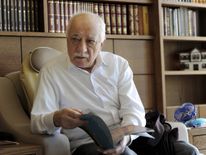failed asylum seeker who blew himself up outside a bar in Germany had pledged allegiance to the leader of Islamic State in a video found on his mobile phone, officials say.
The 27-year-old Syrian man, named by prosecutors as Mohammad D, was killed in the attack in Ansbach and 15 people were injured, including four seriously.
In the video, he talked of "revenge" and German police found chemicals, gasoline and other materials at his home that could be used to build another bomb.
IS said he carried out the attack in response to calls to target coalition countries fighting the militant group.
Joachim Herrmann, Bavaria's interior minister, said: "He expressly announces, in the name of Allah, and testifying his allegiance to Abu Bakr al-Baghdadi, a famous Islamist leader, an act of revenge against the Germans because they're getting in the way of Islam.
"I think that after this video there's no doubt that the attack was a terrorist attack with an Islamist background."
Mr Herrmann said videos containing "Salafist content" had been found on storage devices at the suspect's home.
The man, who had been denied asylum in Germany, carried out the attack outside a wine bar in the southern city.
Security officials say he detonated an explosive device after being turned away from a music festival, attended by thousands of people, because he didn't have a ticket.
Mr Herrmann said the contents of his backpack had the potential to kill and injure many more victims as they included both explosives and metal parts.
The pack used to carry an explosive device
The suspect was known to the authorities and had repeatedly received psychiatric treatment, including for attempted suicide.
Interior ministry spokesman Tobias Plate said the intention had been to deport the man.
"Syrians cannot be deported to Syria at the moment, but that doesn't mean that Syrians overall cannot be deported," he said at a news conference.
"The Syrian in Ansbach was facing deportation and this was to Bulgaria" (where he had first submitted a request for asylum).
Mr Plate said the suspect had received two deportation notices, most recently on 13 July.
A large-scale operation involving 200 police and 350 rescue workers was launched, and a helicopter brought in.
Armed police have raided a building used to house asylum seekers three kilometres from the scene.
Detectives have asked anyone with mobile phone footage to send it in.
Police officers leave after a search at a refugee shelter in Ansbach
Witness Thomas Debinski said: "People were definitely panicking. The rumour we were hearing immediately was that there had been a gas explosion.
"But then people came past and said it was a rucksack that had exploded. Someone blew themselves up.
"After what just happened in Munich, it's very disturbing to think what can happen so close to you in such a small town."
More than 2,000 people were evacuated from the nearby festival.
Germany has been on high alert following a series of incidents in recent days.
Germany's Interior Minister, Thomas de Maiziere, has said police presence will be boosted at airports and railway stations following four violent incidents since last Monday.






